“he was the first to make men’s talents public property…” Pliny

The Forum Romanum
Once in a while, as I do my research for the next book or blog post, or as I’m reading for pleasure, I sometimes come across a person of history who grabs my attention.
Of course, there are many historical personages who give me pause, but not all of their names stay at the back of my mind, whispering, willing me not to forget.
Gaius Asinius Pollio (76 B.C. – A.D. 5) is one of those people.
In my career outside of writing, I’ve worked a lot with public libraries. In fact, I’m a huge fan of public libraries as an institution, and believe they are more relevant than ever, despite the existence of the internet.
Where else can anyone go to learn, get free access to books, music, information, new technologies and more?
As an historian who still laments the burning of the great library of Alexandria, I have nostalgic spot for libraries, but as a writer and historian who believes in making history accessible to everyone, I think the library is a crucial part of any civilized society.
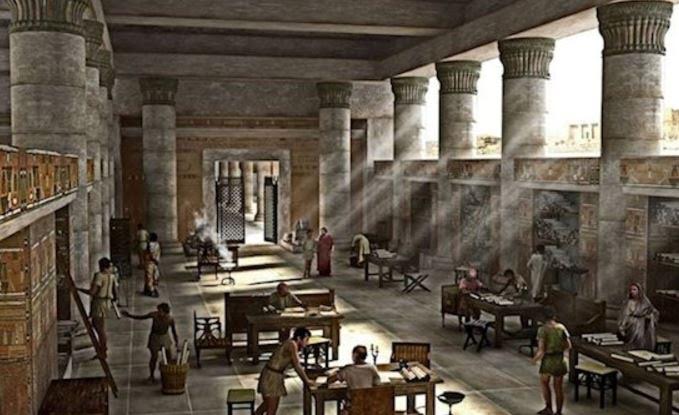
Artist impression of the Great Library of Alexandria
So… When I came across the name of Gaius Asinius Pollio in relation to the founding of the first public library in ancient Rome, I had to learn more!
Pollio lived during one of the most fascinating and pivotal times in Rome’s history. He saw the end of the Roman Republic and the Hellenistic Age, and the birth of the Roman Empire. He rubbed shoulders with some of the titans of Roman history, including Julius Caesar and Augustus.
Pollio was a soldier, a politician, an orator, a poet and playwright, a literary critic, and…wait for it…an historian! In fact, his work, though it does not survive, was supposedly influential on both Plutarch and Appian.
He was also consul in the year 40 B.C.
You could say that Gaius Asinius Pollio was something of an ancient Renaissance man.
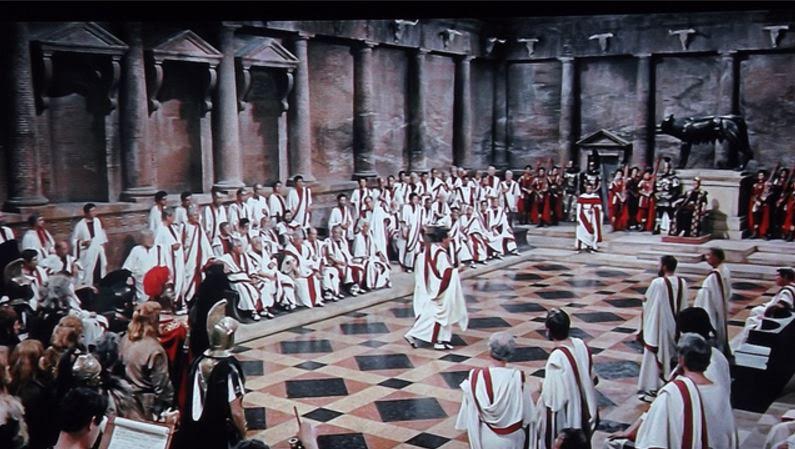
The Roman Senate (A scene from the film, The Fall of the Roman Empire)
As part of Julius Caesar’s staff, he was there when Caesar crossed the Rubicon in 49 B.C., and he occupied Sicily in 48 B.C. once the civil war was well underway. Also in 48 B.C. Pollio was apparently present as Caesar’s legate at the battle of Pharsalus, the decisive battle in which Caesar defeated the forces of Pompey the Great.
After that, he held a command in Spain from 44-43 B.C. where he was engaged in fighting with Pompey’s son, Sextus. Things didn’t go so well in Spain for Pollio, but he managed to survive and threw in his lot with Marcus Antonius after the murder of Julius Caesar.
In 40 B.C. he was consul, along with Gnaeus Domitius Calvinus, another Roman general and senator.
muses of Sicily, essay we now
a somewhat loftier task! Not all men love
coppice or lowly tamarisk: sing we woods,
woods worthy of a Consul let them be.
Now the last age by Cumae’s Sibyl sung
has come and gone, and the majestic roll
of circling centuries begins anew:
justice returns, returns old Saturn’s reign,
with a new breed of men sent down from heaven.
Only do thou, at the boy’s birth in whom
the iron shall cease, the golden race arise,
befriend him, chaste Lucina; ’tis thine own
Apollo reigns. And in thy consulate,
this glorious age, O Pollio, shall begin,
and the months enter on their mighty march.
Under thy guidance, whatso tracks remain
of our old wickedness, once done away,
shall free the earth from never-ceasing fear.
He shall receive the life of gods, and see
heroes with gods commingling, and himself
be seen of them, and with his father’s worth
reign o’er a world at peace.
(The poet, Virgil, on Pollio – 4th Eclogue)
In his role as consul, Pollio was responsible for actively promoting the Treaty of Brundisium between Mark Antony, Octavian, and Lepidus. This was the Second Triumvirate.
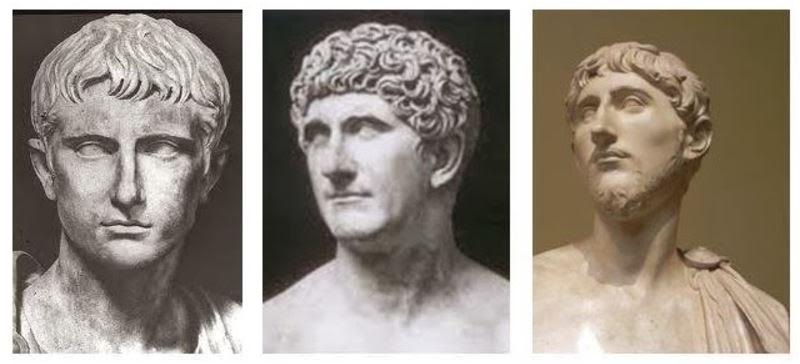
The Second Triumvirate – Octavian, Mark Antony, and Lepidus
In 39 B.C. Pollio became governor of Macedonia. While there, he fought a campaign in Illyria against the Parthini and for his victories, he received a Triumph at Rome, not to mention a small fortune in booty.
At this point he retired from the battlefield. Not a bad way to go out on top, after a Triumph that is.
After the battle of Actium in 31 B.C., that fateful battle in which Antony and Cleopatra were defeated by Octavian and the Hellenistic age came to an end, Pollio hunkered down to write and pursue his literary interests.
He had remained neutral during the Battle of Actium, not wishing to go against Antony who had shown him some kindness in the past – Pollio had been his legate in 41 B.C. when settling veterans in northern Italy.
The broils that from Metellus date,
The secret springs, the dark intrigues,
The freaks of Fortune, and the great
Confederate in disastrous leagues,
And arms with uncleansed slaughter red,
A work of danger and distrust,
You treat, as one on fire should tread
Scarce hid by treacherous ashen crust.
Let Tragedy’s stern muse be mute
Awhile; and when your order’d page
Has told Rome’s tale, that buskin’d foot
Again shall mount the Attic stage,
Pollio, the pale defendant’s shield,
In deep debate the senate’s stay,
The hero of Dalmatic field
By Triumph crown’d with deathless bay.
E’en now with trumpet’s threatening blare
You thrill our ears; the clarion brays;
The lightnings of the armour scare
The steed, and daunt the rider’s gaze.
(Horace, on Pollio’s Triumph; Ode 2.1 to Pollio)
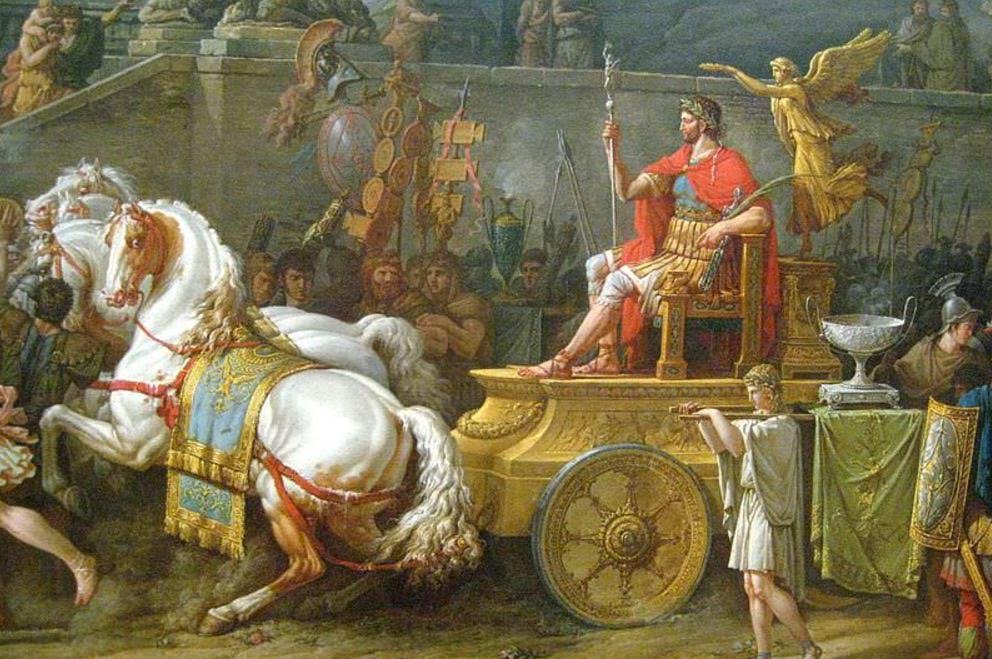
A Roman Triumph
Gaius Asinius Pollio then wrote his Historiae, an account of the Civil Wars from 60-42 B.C., ending with the battle of Philippi, in seventeen books. Sadly none of this work survives, but it’s preserved in its use by both Plutarch an Arrian.
Previously, Pollio had been a literary critic of Cicero, Caesar, Sallust, and Livy to name a few. But he was also highly praising of those whose writings he admired and saw merit in. He became quite an important person on the Roman literary scene in his retirement.
He held public recitals for writers and poets, and was himself the first Roman writer to read his own work in public. At one of his gatherings, his young friend, an up-and-coming poet by the name of Publius Vergilius Maro, or Virgil as we know him, did a reading of a piece he had been working on called The Aeneid.
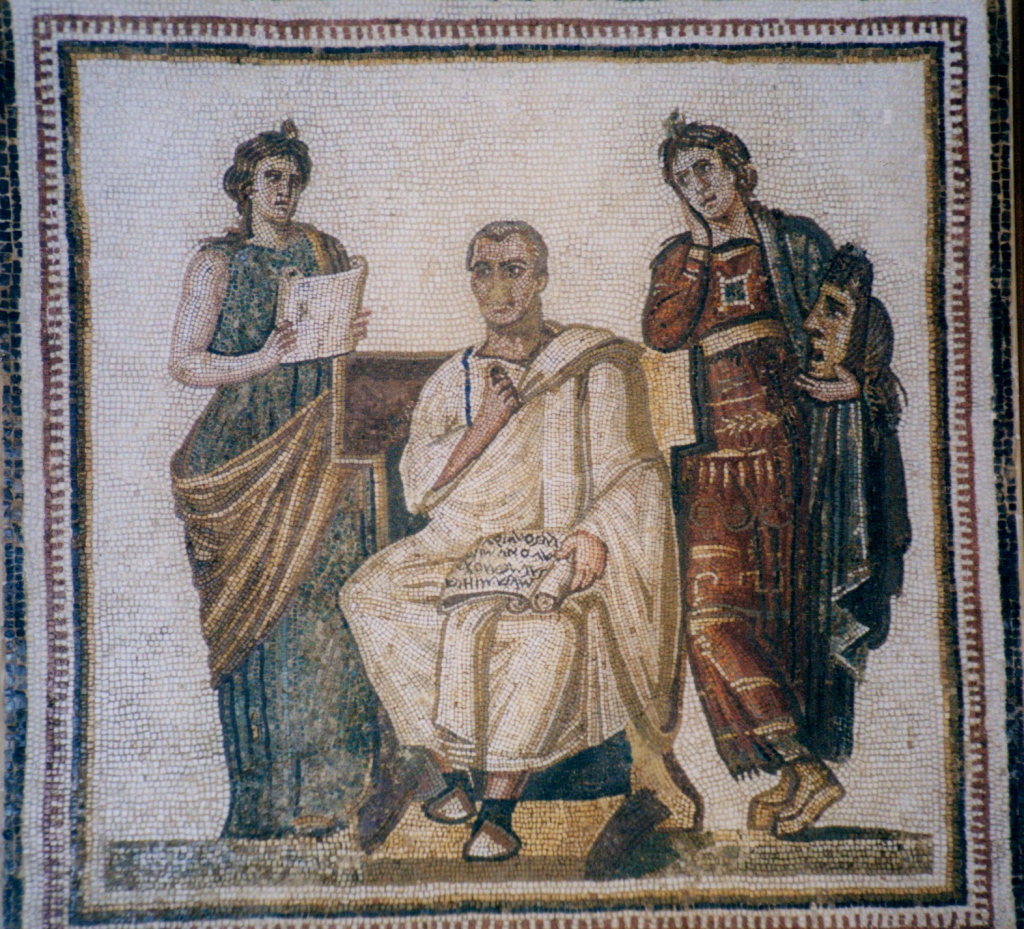
The poet, Virgil
Well, it just so happened that some of Emperor Augustus’ family, or even the man himself, were at the reading and were very impressed with Virgil’s tale of the foundation of Rome and the role the Julii played in it. Thus, did Pollio help Virgil gain his most important patron!
With all of this, it should come as no surprise that Pollio would be responsible for the first public library in ancient Rome.
But, in a way, it is surprising, for until that time, any libraries that existed in Rome were purely private, the domain of the rich, those seeking to impress their peers or hoard knowledge.
In the past, Roman generals had been responsible for the destruction and looting of some of the finest libraries in antiquity. When Lucius Cornelius Sulla sacked the city of Athens in 86 B.C. he had burned the Academy of Athens and its library. When Lucius Aemilius Paulus defeated King Perseus in the Third Macedonian War, he took all of the kings books from the library and made them the first private library at Rome. And in the first century B.C., General Lucullus created a private library from the looted book collections of Mithridates and other Pontic Kings. Apparently, Lucullus did lend books from his private collection, the place ironically becoming a centre for literary Greeks in Rome!
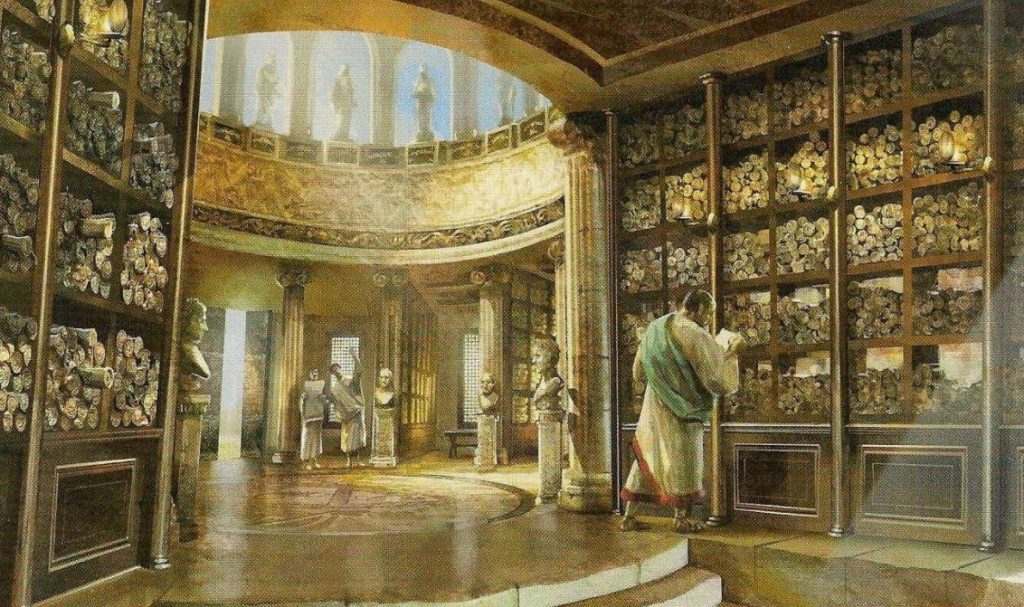
Artist impression of an ancient library
But to that point, there had been no ‘public library’.
Julius Caesar, who is often accused of having burned the Library of Alexandria, the greatest library in the ancient world, did see the value of a public library for Rome and, no doubt after his time in Egypt with Cleopatra, he got the idea to create one at the heart of the Empire.
However, Caesar was killed before the project could come to fruition.
Enter Gaius Asinius Pollio.
With the funds and booty Pollio had accumulated during his governorship of Macedonia and the Illyrian campaign, he decided to establish the first public library in Rome.
The public library was founded during the reign of the Emperor Augustus, to whom Pollio seems to have remained aloof, no doubt due to his previous ties to Mark Antony.
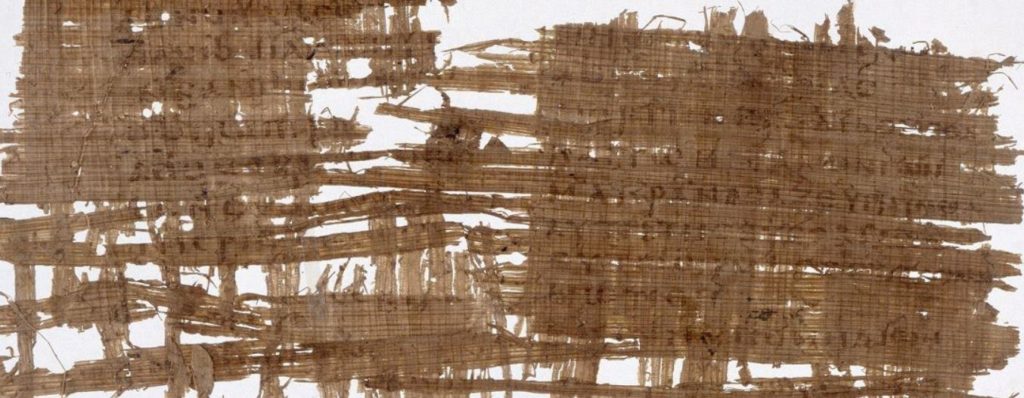
Papyrus fragment with text of Virgil’s ‘Aeneid’ (Rylands Papyri Collection)
Pollio’s library seems to have had separate wings for both Greek and Latin texts, and is supposed to have been housed in the Atrium Libertatis, or the ‘Hall of Liberty’, the exact site of which is unknown.
Another interesting thing about the library was that it was supposedly the first to also be decorated with statues of heroes and literary greats. Pollio loved Hellenistic art, and so his library was also an art gallery, a sort of multi-use facility for the ancient world.
One of the most famous sculptures that was supposed to have decorated Pollio’s public library was the group known as the Farnese Bull.
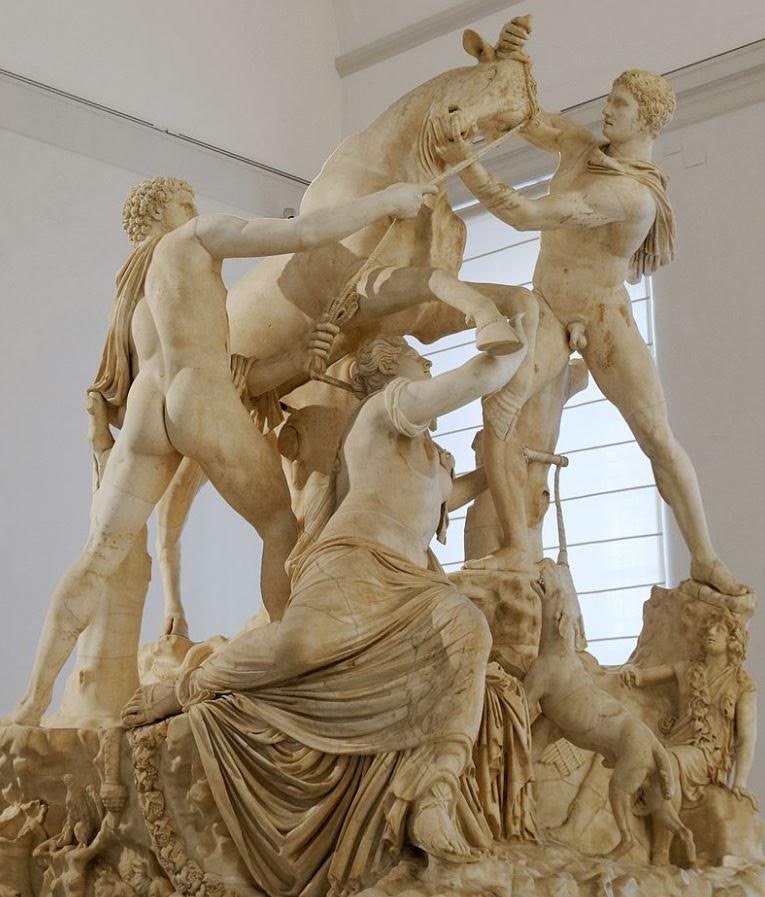
The Farnese Bull
Eventually, it became fashionable for rulers to establish public libraries.
Emperor Augustus founded two more libraries after Pollio’s – one on the Campus Martius, and the other on the Palatine Hill, beside the Temple of Apollo.
Emperor Trajan built the Bibliotheca Ulpia, and Hadrian, philhellene that he was, made right the wrong Sulla had done to the city of Athens and built a new library there. You can still see the remains of Hadrian’s Library in the Plaka neighbourhood of Athens’ modern tourist district.

Hadrian’s Library Athens
Gaius Asinius Pollio may not have been the most well-liked person of his age, but he seems to have commanded respect from his peers and those in power – how else might he have survived so tumultuous a time in Rome’s history?
Despite being quite the soldier and politician, literary critic and author, it seems that he is most often remembered, today at least, as the man who established the first public library in the city of Rome, and that in and of itself, is a good thing.
Thank you for reading.
Marrucinus Asinius, your left hand
you use not beautifully: in joke and in wine
you lift the napkins of the more careless people.
You think this is witty? It escapes you, inept one:
the thing is as dirty and as un-charming as can be.
You don’t believe me? Believe your brother Pollio,
who wants to change your thefts
even for a talent—for he is a boy
stuffed of charm and wit.
(Catullus Poem #12; addressing Marrucinus Asinius, Gaius Asinius Pollio’s brother, who was known for tasteless practical jokes)
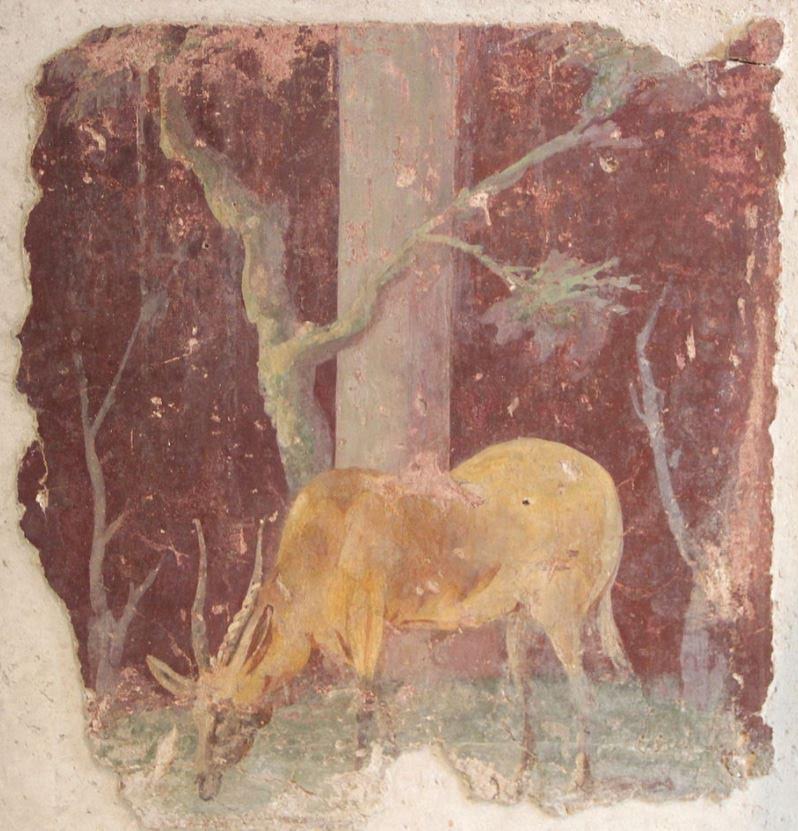
Fresco thought to be from Gaius Asinius Pollio’s Public Library


I enjoyed this article very much. Refreshing to know that we still have much to learn from previous civilizations.
Thank you for your comment, Kathleen. I’m glad you enjoyed this article. And I absolutely agree with you – there is so much we have to learn from previous civilizations. We just have to make the learning of history exciting, interesting, and accessible to everyone! Cheers and have a great day. 🙂
Excellent article, thank you! I recall reading about private libraries and how the fear of fire was so great most of the reading was done during the day and lamps were generally avoided. I imagine the same principle, even more important given the larger collections, applied to public libraries…”please, no food and or lamps”
So glad you enjoyed the article, Sol. I can imagine that lamps would have been avoided…or drinks for that matter! Imagine what a cup of Chian wine would have done to a five hundred year old papyrus manuscript! The historian in me is still sad at the thought of the Library of Alexandria’s fate…
Many thanks for your comment! Cheers 🙂
A fascinating piece, especially in view of the project I have discussed privately. I may have found my first honest tax collector !! It has given me much to dwell on. 🙂
Glad to hear it, Rob! Cheers 🙂
Excellent article, thank you! I enjoyed this article very much.
Thank you very much, Ahmet. So glad you enjoyed it 🙂
Please note Pollios library was not innovating making libraries into art galleries. This was usual in the Hellenic libraries such as Alexandria Great Library, The Serapaion temple library and Caesarium. In Athens and Antioch etc also.
Good point, Rose. Thank you for your comment. In this case, we are only speaking of the first public library in Rome. All of those mentioned were wonderful libraries, and of course some public libraries today continue to incorporate art galleries into their buildings either in partnerships with local art galleries, museums, or evening creating their very own art collections. We love public libraries here at Eagles and Dragons Publishing! Cheers 🙂
Hi, Frenchie here! Working on preparing my exams to become a librarian, this has been really helpful. So sad we have no physical traces left to visit this library! Thank you for this article 🙂
Glad you found the article helpful, Chloé! Best of luck on your exams. We love librarians here at Eagles and Dragons Publishing!